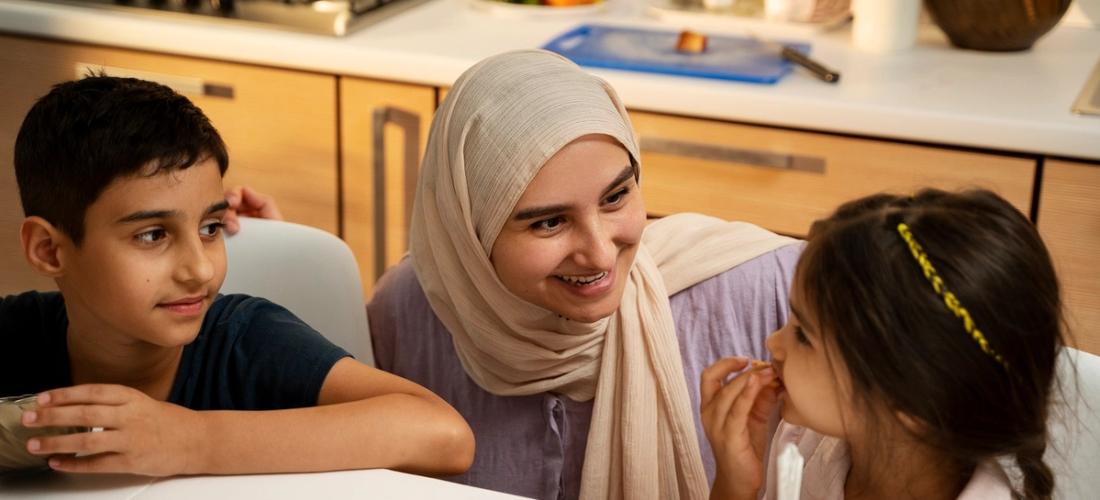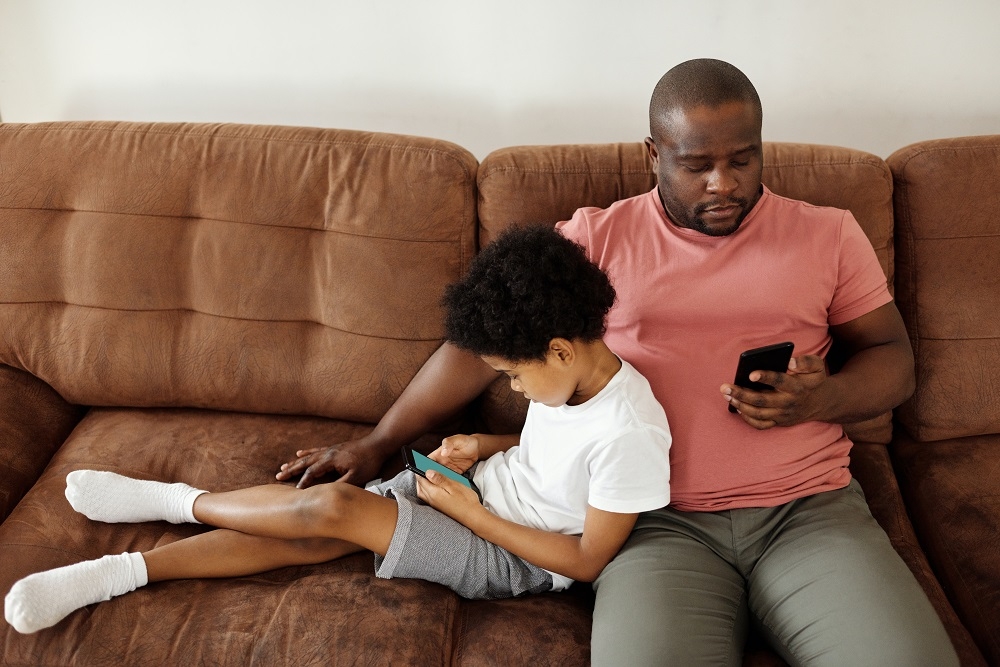5 Ways Parents Can Nurture Confidence in Their Muslim Children & Themselves
Lifestyle
|
Aug 24, 2023
|
6 MIN READ

Image source: Freepik
Editorial Note: As part of Haute Hijab Academy, we are running a series on “building confidence” at various stages of our lives, talking about what deters us or takes away our confidence, why being confident is an important life tool and how to nurture confidence within ourselves and the women and girls in our lives.
Note: I didn't headline this article "5 Things You Can Do to FOR SURE Raise Confident Children." How to raise confident children is your guess as it is mine. We can do ALL THE THINGS, but ultimately it is up to Allah (S) how our children turn out.
However, here on the Haute Hijab team, I am the team member with the eldest children (ages 23, 20 and 15 – don't ask how old I am). Over the years we've shared various stories about our children to each other and shared advice on how to help our kids get through different challenges, especially how to instill confidence in our kids to feel good about themselves as Muslim Americans.
Fact: There is no magic formula. I believe in doing as many practical and sensible dunya-oriented things as possible (like trying to foster open lines of communication and be healthily involved in their lives), but I also believe in covering my kids in prayer and modeling good Muslim living and behavior.
I recently watched a webinar from the Yaqeen Institue featuring Sh. Ibrahim Hindy, Sh. Abdullah Oduro and Sr. Najwa Awada (Amanah Family Counseling) about "how to raise confident kids." They made some wonderful points that validated many of the parenting directions my husband and I have taken with our kids. So, let me share some of what they suggested along with how I've taken this advice and applied it in a practical way in our home.
1. Teach your kids problem-solving skills. This piece of advice came from all of the webinar speakers, and it's a good one. When our kiddos are young, we lay it out for them – do this, don't do that. Maybe we explain the why's of it, maybe we don't. Often we problem-solve for them, which we have do to do sometimes when they are young.

Sr. Najwa Awad, LCSW-C, Amanah Family Counseling; image source: Amanah Family Counseling
However, the sooner we help them figure out how to problem solve, the better we are setting them up for those middle and high school years and beyond. And, there's no set of techniques to problem solving. A lot of it is on a case-by-case basis. However encouraging them to engage in self-advocacy, to ask questions when they don't understand something, to stand up for themselves while centering kindness, to come to you to talk out challenges and come up with workable solutions – all are great things to encourage.
The more they learn to problem-solve (with our parental assistance as needed), the greater (Insha'Allah) their confidence will be in their ability to manage their stuff.
2. Role model the behavior you want in your children. This came from Sr. Najwa, and it feels like a no brainer. However I think we all can attest to how we fall into the trap of do as I say, not as I do.
For example, when it comes to monitoring your children's social media, you will have to set the limits as best possible. As Sh. Abdullah noted, "Sometimes you have to do things that they will not understand, they will not like. [Perhaps] create time zones, create an environment in the home where we are intentional with staying away from those things that distract us [like social media and devices].
Why is this important, especially with regards to social media? Because while it is definitely fun and a great way to stay in touch with friends and family, it's also a huge distraction. As this guest writer wrote, make sure you teach your kids about editing their online and in-person social circles, because these will be a BIG influence on their lives.
One thing I've tried to do over the years (and not always successfully) is make rules on when phones must be put away, gradually releasing my control over their phone usage as my kids aged and showed responsibility. I also tried to dedicate time in the evening when my phone was put away. I also made our evening family meal a device-free zone for EVERYONE.
And throughout their school years (until they were seniors), we had the kids charge their phones in our bedroom at night. All this was to help them get healthy sleep and detach from what was happening online (as best possible), all great things to help build self-confidence.

Sh. Abdullah Oduro; image source: Yaqeen Institute
3. Navigate away from black-and-white thinking. Sr. Najwa advised this in the realm of discussing modesty, dating, sex and other things, which can erode our kids' confidence if they get the wrong information and feel they can't talk to their parents. Said Sr. Najwa, "Kids will find out about sexual relations one way or another. So are you going to provide the framework? Normalize being able to talk about it."
One great piece of advice she gave was to have a journal with each one of your kids. When they feel too shy to ask something directly, they can ask a question in the journal and stick it under your pillow. And you can write an answer and stick it under their pillow.
The point is to foster open communication and to not make our kids feel ashamed for what they may ask us. That will only erode their confidence in being able to come to their parents about anything.
4. Monitor our kids' baselines in terms of mental and physical health, and start doing it when they are young. This piece of advice came from the speakers being asked to address mental health, anxiety, and how to help mitigate this and instill confidence in our kiddos.
Said Sr. Najwa: "Every kid, every adult has a baseline. We want to monitor our kids' baseline: Are they sleeping too much? Are they eating too much, too little? Are they saying negative things about themselves? These are signs something is wrong, and so you want to intervene.
"You as a parent can do so much for your child’s mental health. Have a healthy attachment with them. Provide them the structure they need. Teach them how to cope when things go wrong. not by removing adversity, but helping them navigate by problem solving."
She is so right. If you understand what your child's baselines are (and know that these baselines will change as they grow older), it'll help you know when confidence is waning and something is amiss.
I've definitely missed the signs certain times with my kids, and that kills me as a parent. But this brings me to something else Sr. Najwa said in the webinar: That while it may feel intimidating, parenting is a lifelong journey. You will mess up, but there will also be opportunities to get it right. I've messed up with all my kids, but we keep working at it.

Model the behavior (and device usage) you want your children to do; image source: Pexels
5. Communicate as much as possible with your kids. All the webinar speakers emphasized this, and it's something I've made my biggest priority with my kids. One big advantage I have with my kids is that we are both born and raised in America – so even though there are loads that they are navigating that wasn't around when I was a kid (hello, social media and smartphones), there are also a lot of common themes I experienced that they are experiencing.
I share just enough about my childhood to lay the groundwork for commonality of experiences, but hopefully not so much that they tune out. And I look for all chances to have convos with them – in the car, before they go to bed at night, post-dinner when we are cleaning up.
It doesn't always work. There were definitely a few years when my daughter tuned me out a lot. But I tried not to take it personally and kept reaching out.
Fostering open communication is so key to confidence building. Sharing vulnerabilities has helped my kids see that I don't always have the answer, and that I also question myself at times. But it's all part of the process to nurturing our self-confidence and our ability to problem solve and navigate life as Muslims in this country.
So, what do you do as a parent to help nuture confidence in yourself and your kids? Share with us in the comments below!
Subscribe to be the first to know about new product releases, styling ideas and more.
What products are you interested in?


